Biang Biang Noodles (Chinese Hot Sauce Noodles)
PREP TIME
COOK TIME
TOTAL TIME
Author: Maggie Zhu
Recipe type: Main
Cuisine: Chinese
Serves: 4
INGREDIENTS
Chili Oil
- 2 tablespoons soy sauce
- 1 bulb garlic, grated
- 2 cups peanut oil (or a vegetable oil with a high smoke point)
- 1/2 cup Chinese red chili powder (or Korean chili powder)
- 1/4 cup white sesame seeds
- 2 star anise
- 2 dried bay leaves
- 1 teaspoon coriander powder
- 1 teaspoon cumin powder
- 2 tablespoon ground Sichuan peppercorn
Seasoned soy sauce
- 3/4 soy sauce
- 1/4 cup water
- 1 tablespoon light brown sugar (or white sugar)
- 2 teaspoon whole Sichuan peppercorn
- 1 star anise
- 1/2 cinnamon stick
- 2 whole cloves
- 1/3 cup Chinese black vinegar
(Optional) Tomato sauce (*see footnote 1)
- 1 tablespoon peanut oil (vegetable oil)
- 3 roma tomatoes, chopped
- 3 tablespoons tomato paste
Noodles
- 4 servings homemade fresh noodles (or dried noodles)
- (Optional) 1 cucumber, sliced
- (Optional) 4 small radish, sliced
- 2 green onions, chopped
- (Optional) 1 stalk cilantro, chopped
INSTRUCTIONS
Make chili oil
- Combine soy sauce and garlic in a small bowl.
- Add peanut oil, chili powder, white sesame seeds, star anise, dried bay leaves, coriander powder, and cumin powder into a large skillet (or a wok).
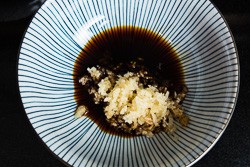
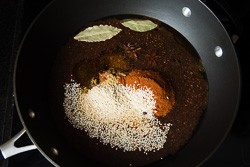
- Heat over medium low heat until it reaches a gentle sizzle. Turn to low heat. Stir constantly. Keep cooking until the chili powder turns dark brown (without turning black), 3 to 4 minutes. If the oil starts to bubble fiercely, remove it from heat.
- Remove the skillet from heat immediately and add ground Sichuan peppercorn. Gently stir a few times and let cook for 10 to 20 seconds.
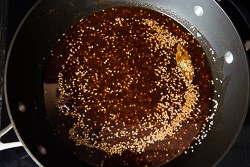
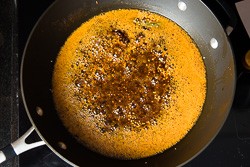
- Carefully add garlic and soy sauce with a ladle. The oil will sizzle for a while due to the added liquid. When the sizzle dies down a bit, stir gently with a spatula to mix everything well (see footnote 2). Transfer everything to a heat resistant bowl to let oil cool off faster.
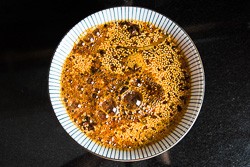
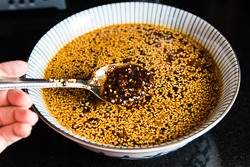
- When the chili oil has cooled, discard bay leaves and star anise. Let sit for 2 hours, or up to overnight, before using.
- Transfer the leftover chili oil to a air-tight glass jar or glass container and store in the fridge up to 1 month.
Make seasoned soy sauce
- Add soy sauce, water, sugar, whole Sichuan peppercorn, star anise, cinnamon stick, and cloves into a small saucepan. Heat over medium low heat until it reaches a simmer. Turn to low heat and let simmer for 15 minutes.
- Strain the sauce and discard the spices. Add black vinegar and mix well. Allow to cool before using.

Make tomato sauce
- Add oil to a medium-sized skillet and heat over medium heat until warm. Add tomato and tomato paste. Chop and stir the tomatoes. Cook until the tomato pieces break down and form a thick sauce, 5 to 7 minutes. Transfer to a bowl.
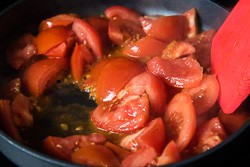
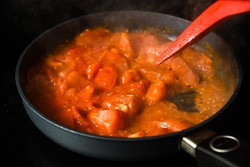
Assemble noodles
- Boil noodles according to instructions. Drain and run tap water over noodles. Drain again and transfer to servings bowls.
- Add tomato paste and seasoned soy sauce according to taste. Add plenty of chili oil with the chili powder (*see footnote 3).
- Top noodles with cucumber, radish, green onion, and cilantro.
- Serve immediately as main.
NOTES
1. You can serve this dish without the tomato sauce, but I highly recommend you to add it. The tomato sauce helps balancing the spiciness and adds a nice thick mouthfeel to the noodle sauce.
2. When I was taking the step-by-step pictures, I poured the oil into the garlic and soy sauce bowl. Please follow steps in the recipe instead. It’s much easier and safer this way.
3. I usually start by adding 2 tablespoons of each. And more soy sauce to increase saltiness or more chili oil to increase spiciness. The noodles should able to be evenly coated with sauce. Add more tomato sauce if it becomes too spicy.
2. When I was taking the step-by-step pictures, I poured the oil into the garlic and soy sauce bowl. Please follow steps in the recipe instead. It’s much easier and safer this way.
3. I usually start by adding 2 tablespoons of each. And more soy sauce to increase saltiness or more chili oil to increase spiciness. The noodles should able to be evenly coated with sauce. Add more tomato sauce if it becomes too spicy.
Tidak ada komentar:
Posting Komentar